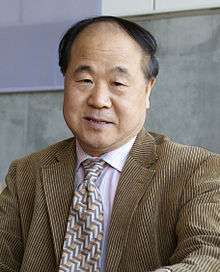Frog (novel)
Frog (Chinese: 蛙; pinyin: Wā) is a novel by Mo Yan, first released in 2009. The novel is about Gugu (姑姑 "paternal aunt"), the aunt of "Tadpole", the novel's narrator. Gugu performs various abortions after the One Child Policy is introduced.[1] The novel discusses both the reasons why the policy was implemented and the consequences of it.[2]
It was translated into English by Howard Goldblatt,[1] a man from the University of Notre Dame who served as Mo Yan's longtime English translator.[3]
In Mandarin Chinese the word for frog, 蛙 (wā), sounds similar to the sound made by a baby (哇 wā), and the narrator's name means "tadpole".[4]
Janet Maslin of The New York Times wrote that the conflicts between the government abortion planners, who believe that they are doing the right thing, and the prospective parents makes Frog a "startlingly dramatic book".[5] Steven Moore of the Washington Post wrote that since the novel includes scenes of anguish, Frog "is no polemic supporting the necessary if heartless one-child policy."[2]
Plot
Gugu, born in 1937, is the first modern midwife in Tadpole's town. She had fallen in love with an air force pilot in 1960, but the officer went to Taiwan.[5]
Reception
Julia Novell of The New York Times wrote that comparisons to The Dark Road by Ma Jian, also about abortions in China, would be inevitable; she argued that the two novels are seemingly different but after "a careful reading" but in fact "Both describe a country that has lost its way, a land in which a repressive state has rendered individuals incapable of making independent moral judgments about political, economic and social behavior and in which women continue to suffer at the hands of reckless male politicians and son-fixated husbands."[1]
Notes
- 1 2 3 "Mo Yan’s ‘Frog’" (Archive). The New York Times. February 8, 2015. Retrieved on March 5, 2016. Print: February 8, 2015, p. BR14 of the Sunday Book Review, title: "Missing Children".
- 1 2 Moore, Steven. "Book review: ‘Frog,’ by Mo Yan" (Archive). Washington Post. March 23, 2015. Retrieved on March 5, 2016.
- ↑ "China's Mo Yan wins Nobel in literature." Associated Press at the Houston Chronicle. October 11, 2012. Retrieved on March 5, 2016.
- ↑ Machart, Bruce (Bridgewater State University). "Review: Mo Yan’s “Frog” is a tale of modern China" (Archive). Houston Chronicle. January 25, 2015. Retrieved on March 5, 2016. Article posted by Maggie Galehouse.
- 1 2 Maslin, Janet. "Review: In Mo Yan’s ‘Frog,’ a Chinese Abortionist Embodies State Power" (Archive). The New York Times. February 26, 2015. Retrieved on March 5, 2016.
